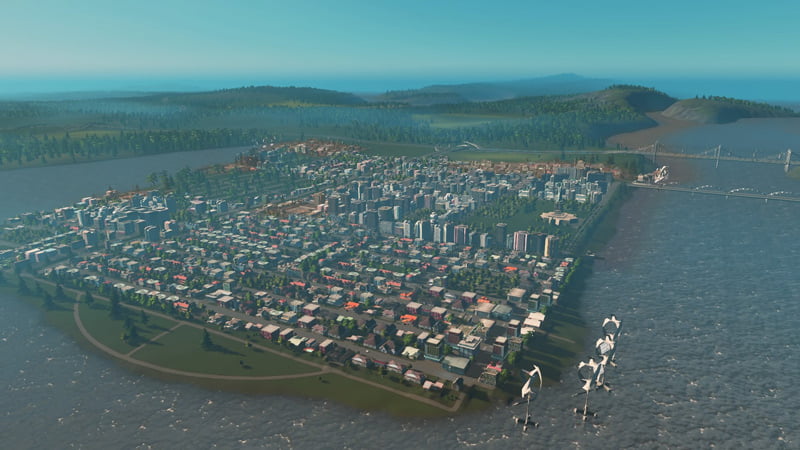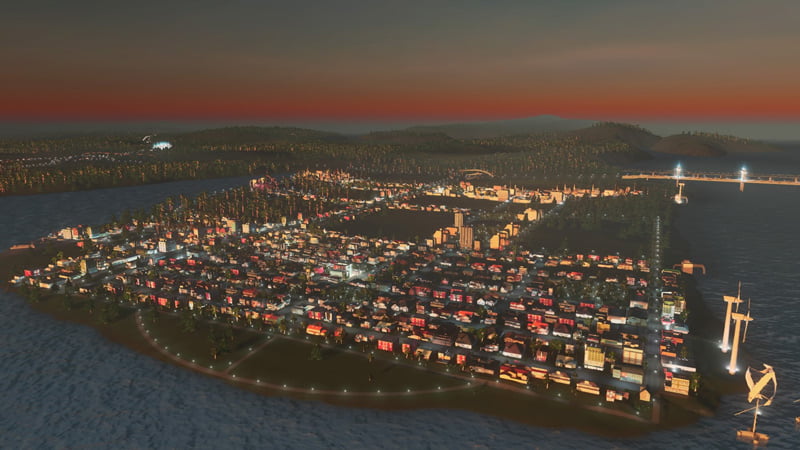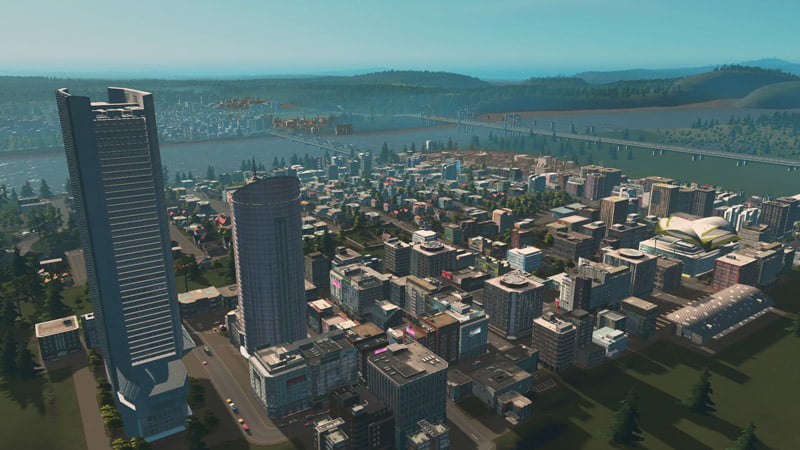It’s built on solid foundations, but how does the Cities: Skylines PlayStation 4 port shape up?
It’s a cliché to say that video games are all about wish fulfilment, but there is a grain of truth to the statement. Games can be great because of their design, or their story, or the worlds they let us explore, but they’re also great because of what they let us become.
I love games because I can become an alien bounty hunter, or a Renaissance assassin. I love games because I can become a Formula 1 champion, or join the Rebellion. And, against all expectations, I’ve also discovered that I love games because I can become a moderately successful town planner.
We’ve been covering Cities: Skylines on Thumbsticks since its launch in 2015. The game was a bold land grab, an attempt to build on the plot vacated by the misguided design changes and botched release of 2013’s SimCity. The game found an instant and appreciative audience, and has since sold over 3.5 million copies, cementing its place as the leading city-builder on PC.
But with an estimated 90 million PlayStation 4 and Xbox Ones in homes around the world, a console version of Cities: Skylines was always going to be a tempting proposition for publisher Paradox Interactive.
Tempting, but also risky.

The history of PC simulation games making the successful transition to home consoles is patchy at best. It’s a list of admirable attempts, honourable failures, plus a few outright disasters. The multitude of menus, and the requirement for fast, responsive inputs are common components of the genre, and best navigated with a mouse and keyboard.
Tasked with making Cities: Skylines work on PlayStation 4 and Xbox One is Melbourne-based porting specialists, Tantalus Media. Their past work includes the impressive HD remaster of The Legend of Zelda: Twilight Princess for Wii U, the Switch versions of Rime and Sonic Mania, and, erm, Funky Barn.
Translating complex PC interfaces to a console controller is an art in itself, and fortunately one that Tantalus have mastered. Folder and item navigation has been assigned to the left and right triggers, and cursor positioning and camera controls to the thumb sticks. Radial menus have been introduced to allow quick access to the various budgetary, policy and administrative menus. Although these inputs are not as fast as using a mouse and keyboard, it’s an implementation that works intuitively, and is quickly committed to muscle memory.


The camera controls are particularly worthy of praise. L2 and R2 control the zoom, and the thumb sticks produce just the right amount of momentum and acceleration to allow you to swoop gracefully around your creations.
And swoop you will, for Cities: Skylines is a delight to explore up close. The console version doesn’t offer the level of detail and graphical fidelity you’ll find on a specced-up PC, but it retains just enough polish and street-level activity to make the world feel alive and populated. Pulling the camera out to take in the entirety of your city, and then zooming right back down to a citizen – or Cim – walking their dog, never gets boring.
The result is that the controls never feel restrictive, nor prevent you from reacting quickly to events on-screen. Tantalus’s efforts are certainly helped by the fact that Cities: Skylines isn’t a particularly time-dependant simulation. The in-game clock ticks at a leisurely rate, and can be slowed to a stand-still, but you’ll rarely need to. The default speed generally gives you enough time to respond to any areas of concern before anarchy or disaster descends.

Prior to Cities: Skylines my experience with the city building genre was limited to a summer holiday, a quarter of a century ago, playing the SNES version of SimCity. Going in, I was a little apprehensive. I expected to be greeted by a complex array of systems and variables that would require a level of thinking and task management beyond the capabilities of my ageing brain.
I was delighted to find that the fundamentals of the genre haven’t really changed at all. The building blocks of Cities: Skylines are as familiar as they come. Cities are created on a foundation of residential, commercial, and industrial zones, plus the three utilities of water, transport and electricity. Once these basic elements are mastered, the game slowly expands its available suite of services and facilities.
The game is beautifully paced, drip-feeding access to new zone types and buildings as a city slowly grows. This also extends to the wide range of policies and budgetary options. Rather than being forced upon the player to manage from day one, their use is introduced organically, ensuring that you’re not paralysed by choice before you have a firm understanding of each option. The leisurely pace makes for a much more welcoming experience than I had anticipated.

By taking its time, Cities: Skylines also tempts you to be bold, and take risks. And when unforeseen problems occur, the solutions are always sensible and coherent; more schools to educate workers, tree-lined roads to reduce noise pollution, and so on. Over time I formed a mental map of the connections between each building and zone type, their dependencies, and their impact on the world at large.
As your metropolis grows, so do the demands of your population. And it’s here that the game loses some of its early momentum. It’s always more enjoyable to create something than it is to maintain it, and once a city reaches a certain size, the repeating pattern of gradual expansion, and civic fire-fighting begins to drag. There are plenty of in-game objectives to strive for – and the rinse and repeat cycle is a no doubt realistic representation of real-life town planing – but Cities: Skylines does lose its impetus. Fortunately, another of the game’s temptations is to take what you have learned and start over.

Cities: Skylines also made me realise the value of having Spotify available on PlayStation 4. My city-building skills were far better employed to a background of movie scores, than the game’s own soundtrack of bland and repetitive muzak.
These are a small quibbles in a game that has a deservedly taken the city-building crown from SimCity. And Tantalus Media’s excellent work in porting Cities: Skylines ensures the game is just as recommended on console.
Game: Cities: Skylines
Platform: PC, Xbox One, PlayStation 4 (Tested)
Developer: Colossal Order/Tantalus Media
Publisher: Paradox Interactive
Release Date: Out Now






